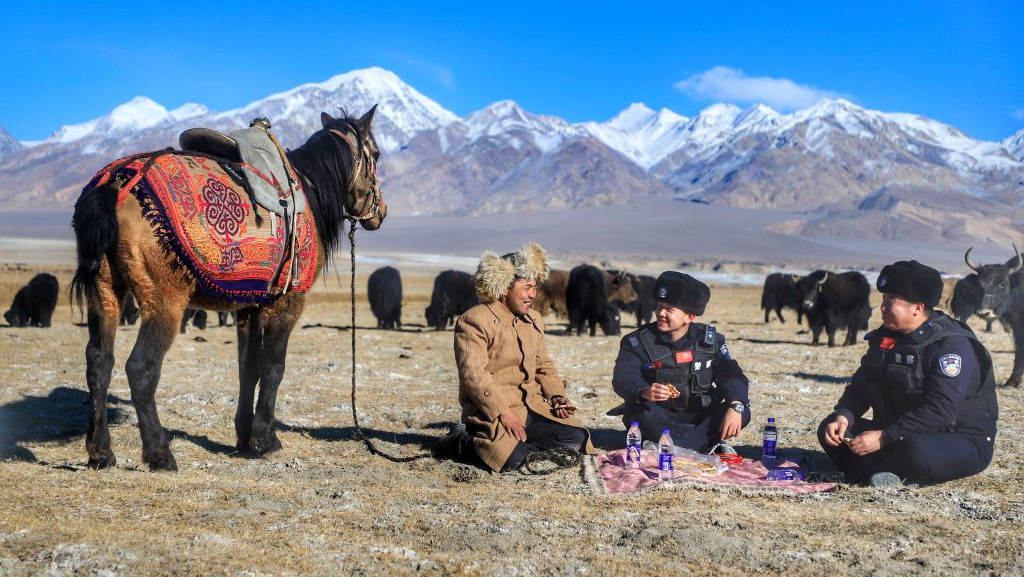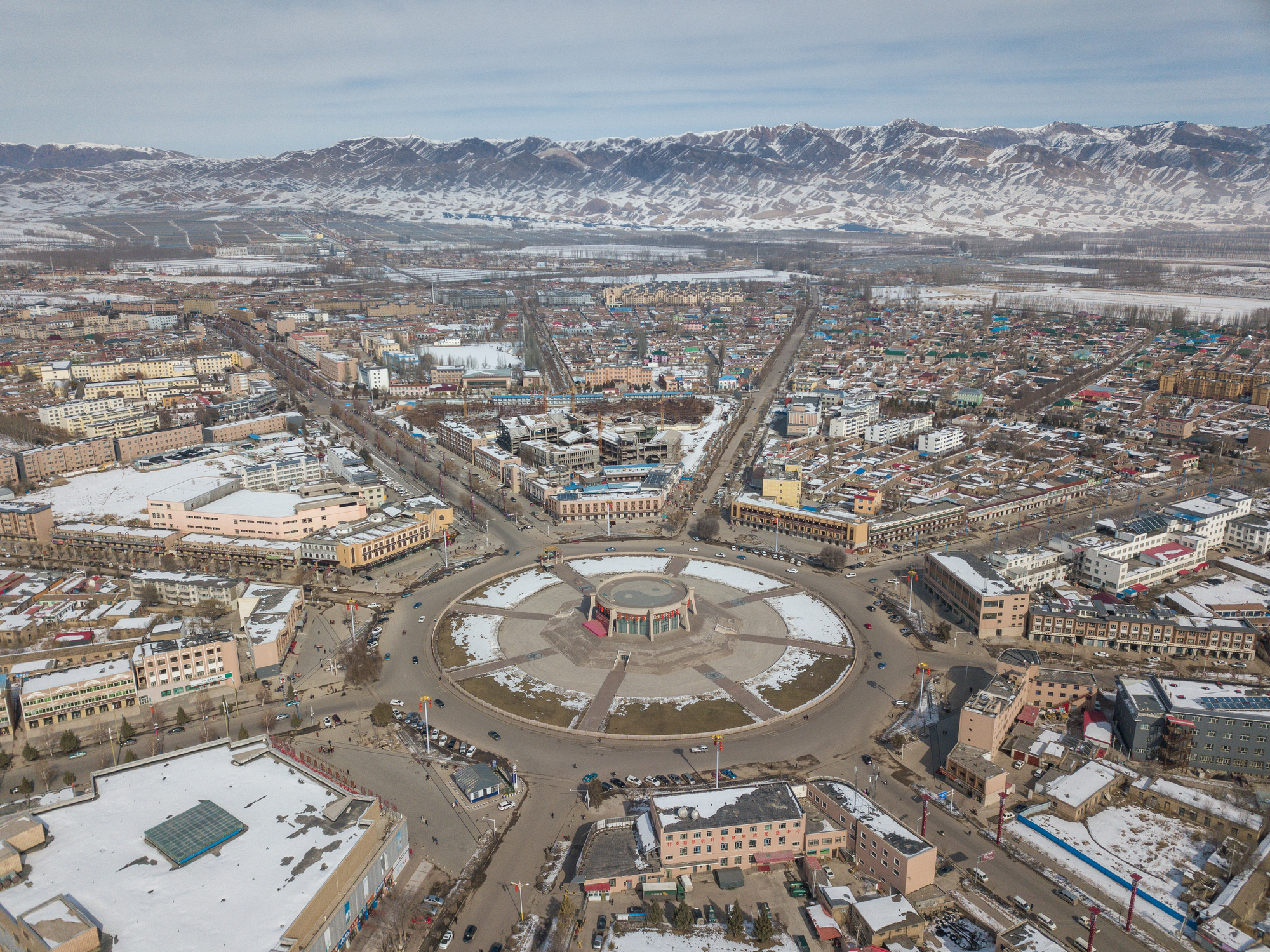
Border police help herders drive yaks in winter pastures in Akto County, Xinjiang Uygur Autonomous Region, China, December 19, 2020. /Getty
Border police help herders drive yaks in winter pastures in Akto County, Xinjiang Uygur Autonomous Region, China, December 19, 2020. /Getty
Editor's note: Dennis Etler is a current affairs commentator who holds a doctorate in anthropology from the University of California, Berkley. He conducted archaeological and anthropological research in China throughout the 1980s and 1990s and taught at the college and university level for over 35 years. The article reflects the author's opinions, and not necessarily the views of CGTN.
The West prides itself on its values, including freedom of speech and thought. Especially valued is the vaunted academic freedom. They are also vociferous in condemning those who they consider being in breach of them.
Not adhering to Western values is considered a cardinal sin, and often invoked when attacking China. According to these arbiters of supposedly "universal values," China cannot be trusted because it adheres to its own set of traditional and socialist core values.
But does the West really live up to their own standards? Apparently not. Take for instance the case of Prof. Christian Meister of the University of Strasbourg, in France.
Prof. Meister has an open mind regarding China. He visited the Xinjiang Uygur Autonomous Region in 2019 and visited a few vocational education and training centers set up to combat radical religious indoctrination that had spread among a certain segment of the population due to foreign forces intent on creating chaos and fomenting civil strife.
In interviews, Prof. Meister gave a favorable assessment of China's efforts and suggested that France could learn from them. He also spoke favorably about China's response to the COVID-19 outbreak in Wuhan and supported the presence of China's Confucius Institutes in France.
All these views of Prof. Meister should not have elicited any controversy in a country that supposedly values free speech, free thought, and academic freedom. A few years ago, a French academic who spoke favorably of China would not have warranted any outcry, but the times have changed and as China has become more powerful the West has become more antagonistic.
A weak China doesn't pose much of a challenge to the Western sense of superiority; but a strong China appears to be an affront to their pride.
As a result, China is now pilloried for an assortment of alleged sins that fly in the face of reality, and anyone who suggests otherwise is criticized as a Chinese stooge or minion who must be censored and ostracized.

A view of the city of Eight-Trigrams in Xinjiang, China. /Getty
A view of the city of Eight-Trigrams in Xinjiang, China. /Getty
One such victim is Professor Meister who was forced to resign from his academic position because of a concerted effort by an anti-China journalist who hounded him in the French press accusing him of being an agent of the Chinese state tasked to spread Chinese propaganda. It seems anything that does not comport to the anti-China narrative is ipso facto Chinese propaganda.
But, who is actually spreading propaganda? The allegations made regarding China's policies in Xinjiang are based on hearsay and second-hand research by avowed enemies of China who have an ideological ax to grind.
The credibility of those who accuse China of human rights abuses should be questioned. They have clear ulterior motives as they support self-avowed separatists who wish to dismember China. It's very easy to concoct horror stories. They are a popular genre in the movie industry, the more outrageous the better; but should they be taken at their word? Such evidence would be thrown out of any court but is readily accepted by Western journalists.
The evidence for genocide forced sterilizations and forced labor in Xinjiang is likewise not based on any credible evidence, but interpretations of dubious second and third-hand source materials by a single religious bigot, Adrian Zenz, who has made a career out of spinning unsubstantiated tales of Chinese human rights abuses in Xinjiang, even though he has not set foot in China for years.
Under normal circumstances, someone of his caliber would be laughed off the stage and ridiculed as a crank. But, Zenz has been elevated to the status of an all-knowing sage when it comes to China's policies in Xinjiang.
Ironically, French President Emmanuel Macron has championed anti-Muslim laws that are also meant to combat religious radicalism and require French Muslims to accept its humanist values, yet there is no criticism of France in the Western media and France's colonial legacy in Africa and the Pacific Islands is known for its genocidal conduct and gross human rights violations that reverberate to this day.
France still refuses to accept responsibility for its colonial atrocities in Algeria, Vietnam, the Marshall Islands, and elsewhere.
All this points to the fact that the current Western hysteria regarding China has no basis in reality. The West has no qualms in turning a blind eye to its own egregious human rights violations but finds every opportunity to falsely accuse and impugn China.
This can only be attributed to a premeditated smear campaign. It has become an ideological virus that has spread throughout the world and is as grave a danger to global peace and security as COVID-19.
(If you want to contribute and have specific expertise, please contact us at opinions@cgtn.com.)

